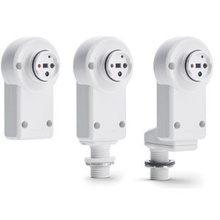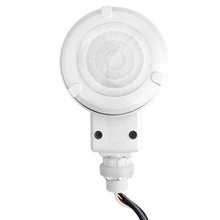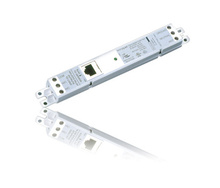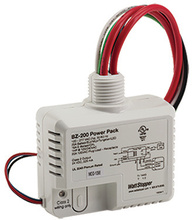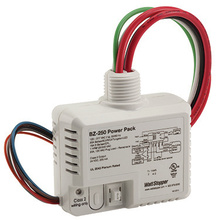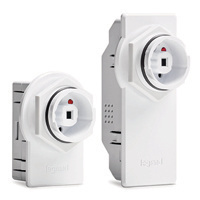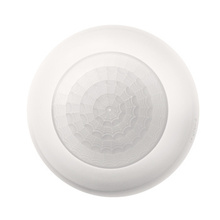Occupancy and Vacancy Sensors
Occupancy and Vacancy Sensors maximize energy savings, ensuring that lights are turned off or to a lower level when spaces are unoccupied or adequate daylight exists. Sensor options include passive infrared, ultrasonic, and a combined dual technology of both passive infrared and ultrasonic. For applications from warehouses and parking garages to offices and classrooms, Wattstopper’s energy-efficient occupancy and vacancy sensors offer the ultimate convenience and security for commercial spaces.Brand
Choose from one of Legrand's brands.
Type
Value that Specifically Names the Type/the Application Value of the Closest Piece of Equipment/the Designated Type of Construction/the Generic Type/the Manufacturer Type Designation/the Specific Function/the Type of Application
Product Certifications
Trust in quality and compliance. Use this filter to find products that have undergone thorough testing and evaluation to ensure they meet the quality and safety standards for a wide range of certifications.
Standard
The industrial standard(s) to which a device is manufactured, operated, or tested.
Frequency Band
A Continuous Group, or Range, of Frequencies with an Upper Limit and a Lower Limit
Amperage
Maximum electrical current the conductor or device can carry before sustaining immediate or progressive deterioration
Installation Location
Where a Device is or is to be Installed
NEMA Rating
National Electrical Manufacturers Association Ratings are Standards that are Useful in Defining the Types of Environments in Which an Electrical Enclosure can be Used
Compatibility
Capability of Being Used with or Connected to Different Types of Devices or Components without any Modifications
Number of Gangs
The amount of switches on the plate.
Connector
Refers to the specific types of connections a device uses to join electrical conductors and create an electrical circuit. When you select the first desired connector, a second filter will appear listing any connectors on the opposite end of your selected connector on a device.
Antenna
A Conductor or Set of Conductors Used to Radiate RF Energy Into Space or to Collect RF Energy from Space or to Do Both
Indoor/Outdoor
Enviromental Conditions rating on the product. Indoor Only, Outdoor, Both
Input Voltage
The Difference of Electrical Potential Between Two Points of an Electrical or Electronic Circuit Entering a System
Bracket
The Type of Support, as of Metal or Wood, Projecting from a Wall or the Like to Hold or Bear the Weight of a Shelf, Part of a Cornice, Etc.
Availability
Product is available to buy on Legrand.us
Load Type
Denotes the type(s) of load that can be applied to a dimmer, which determines its compatible light sources.
Output Voltage
The Voltage Measured at the Output Terminals of a Power Supply
Mounting Type
The way the item is mounted for display. The method by which a sign or label is affixed to a surface for display. Many signs will not have any defined mounting type and so will have no value captured for this attribute.
Number of Buttons
The Number of Keys/Switches in the item Used for Selecting a Particular Function
Sensitivity
The Minimum Input Which the Device can Sense and Produce the Output
Has Battery
A Device for Converting Chemical Energy Into Electrical Energy a Group of Two or More Connected Voltaic Cells
Wire Size
It is the Normal Size of the Conductors for Building Wire
Load Rating
The maximum load that a device is designed to withstand without breakage or loss of performance.
Battery
A Device for Converting Chemical Energy Into Electrical Energy a Group of Two or More Connected Voltaic Cells
Encryption
The Activity of Converting Data or Information Into Code
Cable Length
The Longest Dimension of Insulated Conductors
Wattage
amount of watts used
Connection TypeTooltip Title
Style or Type of Connection Used
Product Family
Used to identify and differentiate offerings within a particular product line. Product families are typically treated as adjectives. It is not recommended to use the product line (ex: Wiremold®) and product family names (Evolution™) together. This will introduce a level of unnecessary confusion for the audience.
Sensing Range
The total Possible Sensing Capability of the Sensor, Beginning After the Deadband, and Extending Out as Far as the Sensor is Able to Reach Effectively
Number of Switches
Number of electrical switches
Voltage
The Rate at Which Energy is Drawn from a Source that Produces a Flow of Electricity in a Circuit
Operating Temperature
The Temperature at Which the Unit is Safely Operated or Kept without Damaging or Changing the performance Characteristics of the Unit
Included
The Supplementary items Supplied with the Product Which May be Necessary for the Optimum Operation of the Product
Product Has Potential to Contribute to LEED
This product contributes to earning credits in the LEED rating system.
Wire Connection Type
Describes the method used to connect wires to the device, such as screw terminals, push-in connectors, or lead wires.
Operating Temperature Min
Indicates the lowest possible temperature a device can be safely used without the risk of failure or damage.
Battery Life
Describes the approximate amount of time a battery can power a device before it needs to be recharged or replaced.
Security Method
Describes the functions or methods used by a device or software to protect against unauthorized access to a device or software platform.
On Function
Describes the mode of operation for devices that can be turned on, indicating whether they stay on continuously or operate on a timer or sensor.
Number of Connections
The number of connections a product is able to make to other devices.
Battery Capacity
Describes the maximum amount of electrical charge that a battery can store and deliver.
Engraving Type
Refers to the available styles to mark or inscribe text, symbols, or patterns on a product.
Seismic Tested
Indicates whether a device has been tested to withstand and/or perform under certain seismic conditions.
Sensor Coverage
Describes the total area, measured in square footage, within which a sensor can detect presence or movement.
Antenna Pattern
Captures the directional representation of how radio waves are sent and received by the antenna.
Sensitivity Adjustment
Refers to any customization settings, or range of adjustments for motion detection sensitivity, required to turn lights on.
Storage Temperature
Describes the temperature or range of temperatures at which a product can be safely stored or kept without damaging or altering the performance characteristics of the device.
Device Front Face Size
Describes the general proportions of a product's front face relative to the overall device.
Indicator
Describes the type/specification of signaling a device uses to indicate abnormal and/or operating conditions.
Timer Type
The mechanism by which the timer operates, such as mechanical, digital, or programmable.
Topology
The arrangement in which the Nodes of a LAN are connected to each other.
Sensor Coverage Pattern
Describes the shape of the area that a sensor is able to detect presence or movement within, measured in degrees.
Horsepower Rating
Refers to the power capacity of a device under normal load conditions, measured in horsepower (HP).
Current Draw
The amount of electrical current the device uses during operation, measured in amperes (or amps).
Requires Neutral Wire
Indicates whether a device requires a neutral wire to function properly.
Operating Humidity
Describes the range of humidity at which a device can be utilized safely without the risk of failure or damage.
Product Series
A collection of related products that share a common design, technology, or purpose. Products within the series either maintain a cohesive brand / style identity or work together to serve a particular solution.
Switch Type
Refers to the style or operation method used by a switch to control lighting or other electrical devices.
Wireless Range
Describes the maximum distance wireless devices can be separated while preserving signal quality and reliability.
Line Frequency
The frequency of alternating current (AC) in an electrical power system, measured in Hz. Also commonly referred to as Utility Frequency, Power Line Frequency, or Mains Frequency.
Features
Unique characteristics and functionality that set the product apart from others in its field.
Sensor Technology
The technology used by a device to sense a change in signal or stimulus.
Number of Poles
Single pole switches have two terminals and control one light fixture from one location. 3-Way switches have three terminals and can control one fixture from two locations. 4-Way switches have four terminals can control one fixture from three locations. Multi-location refers to switches connected to a smart lighting system.
Operating Temperature Max
Indicates the highest possible temperature a device can be safely used without the risk of failure or damage.
Warranty Type
The product warranty that accompanies the specific product.
Environmental Conditions
Describes the relative range of climatic standards a device can safely operate within.
Finish
Describes the specific surface treatment applied to the outer product for either aesthetics and/or durability.
Control Algorithm
Refers to the set of rules or calculations a device utilizes to automate and regulate its use to optimize performance.
Ultrasonic Frequency
Describes the specific frequency at which a sensor emits and detects sound waves in order to measure distances, detect objects, or perform other functions.
Light Level Adjustment
Captures the range over which a device can adjust the intensity of light in order to maintain the desired ambient light setpoint, enhancing comfort and energy savings.
Device Backbody Size
Describes the general proportions of a product's backbody relative to the overall device.
Number of Rockers
The total number of rocker-type electrical switches included on a device. Typically used to switch between two or more functions.
Sensor Mounting Height
Describes the optimal vertical distance at which a sensor should be installed to ensure reliable detection of motion or other target conditions.
Location Rating
Denotes the classification used to assess the suitability or performance of a device based on the specific environmental location in which it operates.
Material
Indicates the primary material(s) used to construct a product.
Application Sector
Refers to the expected environment(s) or intended usage(s) for a product (e.g. Residential, Commercial, Industrial, etc.).
Response Frequency
Frequency response is the quantitative measure of the output spectrum of a system or device in response to a stimulus, and is used to characterize the dynamics of the system. It is a measure of magnitude and phase of the output as a function of frequency, in comparison to the input.
Target Size
The Dimensional Specification of the Object Which is Set as a Target for the Sensor
Sensor Type
The Device that Receives a Signal or Stimulus (As Heat or Pressure or Light or Motion Etc.) and Responds to it in a Distinctive Manner
Stock Level
Filter your results to only in-stock products sold directly on legrand.us.
-
Added to Favorites Go to favoritesRemove from favorites?Something went wrong. Please try again later.Product not added for comparison. Please remove any current selection to add this. Manage SelectionsHi/Lo PIR Straight Side Mt Sens, 12-32V, 40ft lens, WhiteFSP-201B-S-L7-W WattstopperThe FSP-2x1B sensors provide multi-level control based on motion and/or daylight contribution.Other Options Available
-
Added to Favorites Go to favoritesRemove from favorites?Something went wrong. Please try again later.Product not added for comparison. Please remove any current selection to add this. Manage Selections0-10V PIR FIXTURE SENSOR BLE 1 2-32VFSP-301B WattstopperThe FSP-3x1B sensors provide continuous dimming light level control based on motion and/or daylight contribution.
-
Added to Favorites Go to favoritesRemove from favorites?Something went wrong. Please try again later.Product not added for comparison. Please remove any current selection to add this. Manage SelectionsLarge Lens Collar (Compatible w/L4 & L7 lenses), WhiteFSP-C2-W WattstopperFSP-2x2 sensors provide multi-level control based on motion and/or daylight contribution.
-
Added to Favorites Go to favoritesRemove from favorites?Something went wrong. Please try again later.Product not added for comparison. Please remove any current selection to add this. Manage SelectionsFixture Power Pack, 120/277/347V, 60HzFS-PPV2 WattstopperThe FS-PP Fixture Power Pack provides 24 VDC operating voltage to the FS Low Voltage Sensor series via the RJ45 connector built onto each sensor.
-
Added to Favorites Go to favoritesRemove from favorites?Something went wrong. Please try again later.Product not added for comparison. Please remove any current selection to add this. Manage SelectionsPower Pack, 120-277V, 50/60Hz, 24VDC, 225mA,BZ-200-U WattstopperThe BZ-200 power pack switches connected loads On and Off in response to Wattstopper low voltage occupancy sensors.
-
Added to Favorites Go to favoritesRemove from favorites?Something went wrong. Please try again later.Product not added for comparison. Please remove any current selection to add this. Manage SelectionsPower Pack, 120-277V, 50/60Hz 24VDC, 225mA, w/Auto/Man-OnBZ-250-U WattstopperThe BZ-250 power pack switches lighting or plug loads On and Off in response to low voltage control inputs, and provides up to 225mA at 24VDC to power Wattstopper occupancy sensors.
-
Added to Favorites Go to favoritesRemove from favorites?Something went wrong. Please try again later.Product not added for comparison. Please remove any current selection to add this. Manage SelectionsLINE VOLT 0-10V SENSOR CONT DIMMINGFSP-212D WattstopperFSP-2x2 sensors provide multi-level control based on motion and/or daylight contribution.Other Options Available
-
Added to Favorites Go to favoritesRemove from favorites?Something went wrong. Please try again later.Product not added for comparison. Please remove any current selection to add this. Manage SelectionsDALI OUTDOOR PIR SENSOR HI MOUNT SOCKET CONNECT WHITEFDP-301SR-L7-W WattstopperThe FDP sensor series allows your lighting fixtures to participate in the internet-of-things (IoT) revolution.Other Options Available
























